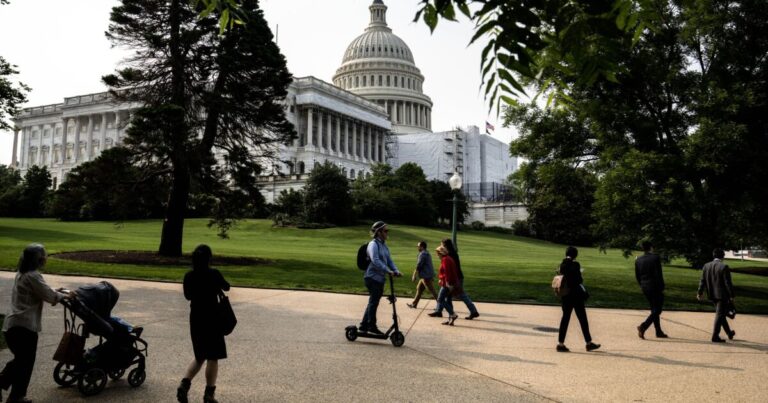Senate Republicans are moving forward with a plan to mask the $3.8 trillion cost of extending expiring tax cuts in President Donald Trump’s signature economic legislation by using an unprecedented accounting maneuver.
GOP senators voted Monday in favor of the plan to count the extension of Trump’s 2017 tax cuts as costing nothing, over objections from Democrats and despite concerns raised by economists about the U.S. debt trajectory.
Republicans argue that using this accounting method, known as “current policy,” would allow them to include more tax cuts in Trump’s “One Big, Beautiful Bill.”
The cost of extending Trump’s first-term tax cuts, according to the Joint Committee on Taxation, totals $3.8 trillion. The other tax provisions in the bill cost nearly $693 billion — and only that smaller figure is considered in the official price tag for the bill.
The accounting move also makes it easier to sell the legislation to fiscal conservatives, who have threatened to oppose the package because it does not reduce deficits.
Democratic lawmakers and independent budget experts dismiss the method as a way for Republicans to mask costs.
“Even a preschooler knows this is magic math,” said Patty Murray of Washington State, the top Democrat on the Senate Appropriations Committee. She accused Republicans of “trashing the rules” to pass the bill.
Senator Lindsey Graham of South Carolina said that Republicans aren’t doing “anything sneaky.”
“The bottom line is we are going to make the tax cuts permanent,” he said.
The vote allows Republicans to circumvent rules that would normally limit the fiscal impact of legislation passed through the fast-track reconciliation process. Economists have warned the legislation, regardless of how it’s counted, would still add trillions to deficits.
Some also raised concern that it would set a dangerous precedent and allow lawmakers to use the accounting maneuver to extend costly provisions in the future, worsening the nation’s fiscal trajectory. The U.S. is already projected to reach record debt levels in a few years.
Trump has urged Congress to pass the bill, which includes much of his economic agenda, by July 4. The Senate is aiming to pass the bill by Tuesday. The House will also need to vote on the Senate-passed version, and could do so as soon as Wednesday.
The nonpartisan Congressional Budget Office Sunday estimated the Senate bill would add $3.3 trillion to deficits over 10 years compared to current law. The price tag compared to the GOP baseline is a $508 billion savings.
The 2017 Trump tax cuts were not scored as permanent when they were enacted. The new bill also contains a series of temporary tax cuts including a five-year increase in the limit on the state and local tax deduction that are kept short-term in order to reduce the price tag.


